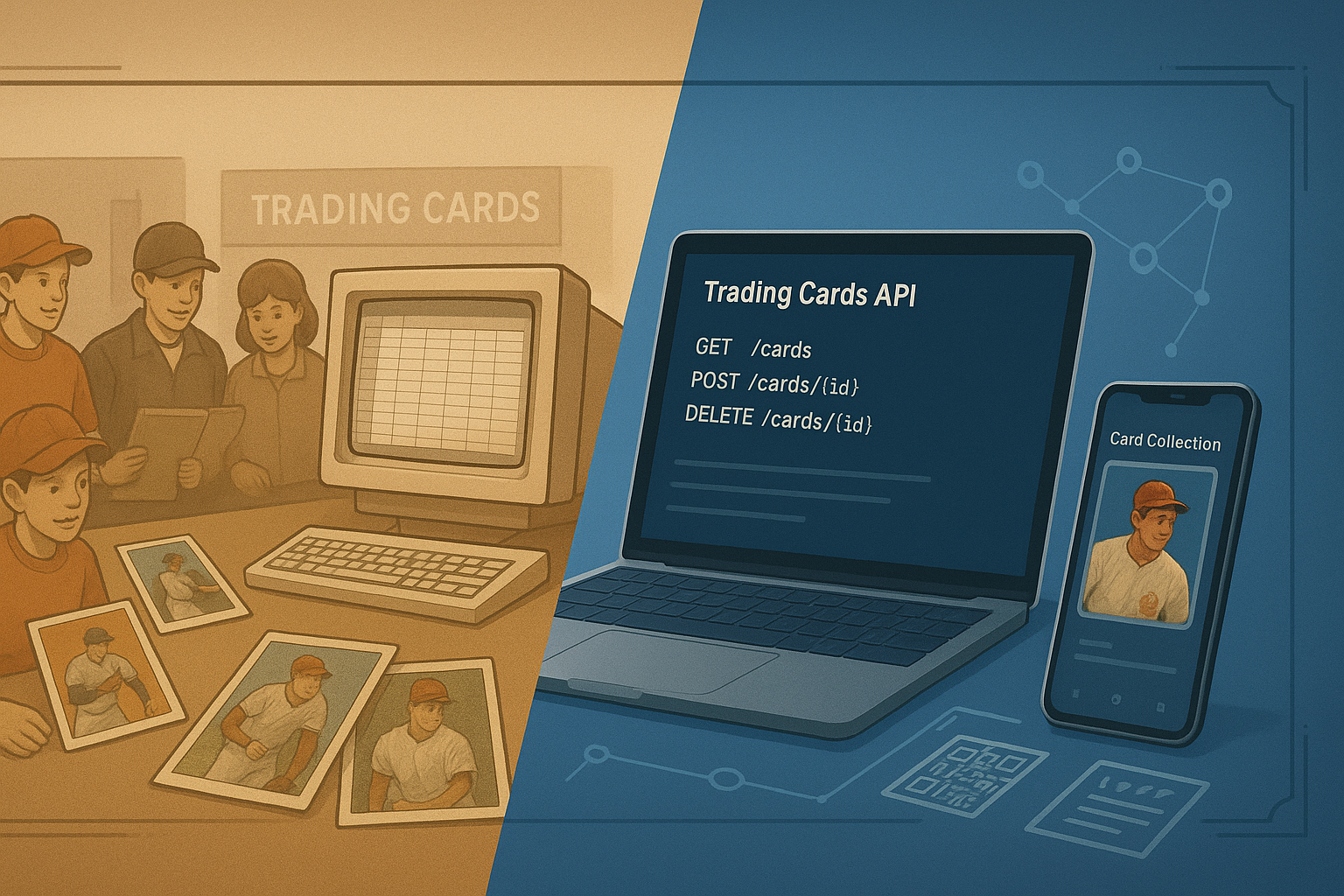
A response to Ryan Alford's insights on Sports Cards Nonsense
I was listening to the latest episode of Sports Cards Nonsense watching the Mariner game when guest Ryan Alford (host of Collectibles on SI) said something that made me nearly choke on my popcorn. When asked about the weirdest things in the trading card hobby, his answer was spot-on and brutally honest:
"The lack of sophistication in the hobby. From card management to trade night, we're not facilitating deals and trades and collecting to the level that we could with technology."
Ryan painted a picture that every collector knows too well: trade nights with 5,000 people where nobody knows what anyone has, what anyone wants, or what anyone's willing to sell. His question was simple but profound: "Why is there not technology facilitating that?"
The answer? Because we've been treating a multi-billion dollar industry like it's still 1995.
The Problem Is Real (And Expensive)
Ryan's right about the money in the hobby - we're talking about a $12.6 billion market projected to hit $23 billion by 2031. But here's what's mind-blowing: an industry this size is running on technology from the dial-up era.
Think about it:
- Collectors manage thousands of cards in Excel spreadsheets
- Every marketplace has its own proprietary data format
- Apps can't talk to each other because there's no standardized card data
- Trade nights are basically analog networking events in a digital world
We've got people spending six, even seven, figures on cards but using the same organizational tools their grandparents used for baseball card collections in shoeboxes.
Why This Matters for Developers
If you're building anything card-related - whether it's a collection tracker, marketplace integration, or portfolio analyzer - you've probably run into these problems:
Data Inconsistency: Every platform names the same card differently. Is it "2023 Topps Chrome Patrick Mahomes" or "2023 Chrome Patrick Mahomes II"? Good luck building search that works across platforms.
Manual Entry Hell: Want to add your collection to an app? Hope you like typing for hours because there's no standard way to import/export card data.
Isolated Ecosystems: Built a great tool? Too bad it can't communicate with any other tool in the space because everyone's working with different data structures.
The Infrastructure Layer That's Missing
This is exactly why we're building the Trading Card API and the Open Checklist Project. We're not just building another card app - we're building the infrastructure layer that makes Ryan's vision possible.
What This Looks Like in Practice
Imagine that trade night scenario, but with technology:
- Before you arrive: Upload your collection via API integration with your portfolio tracker
- At the event: Scan QR codes to instantly see what others have available
- Real-time matching: Get notifications when someone has cards you want
- Instant transactions: Complete trades with automatic collection updates
This isn't science fiction. This is what happens when you have:
- Standardized card data (Open Checklist Project)
- Comprehensive API access (Trading Card API)
- Developer tools that make integration simple (our SDK)
The Technical Foundation We're Building
Trading Card API: A comprehensive REST API that provides standardized access to card data - sets, players, variations, all properly structured and consistently named.
Open Checklist Project: Community-driven standardization of card data that creates the common language every app needs.
Developer Tools: SDKs and documentation that make it easy for any developer to build the solutions Ryan's talking about.
Why Now? Why Us?
The trading card industry is at an inflection point. We've got:
- A new generation of collectors who expect technology to just work
- Mobile-first users who want instant access to information
- An investment mindset that demands sophisticated portfolio tools
- AI capabilities that can solve authentication and valuation challenges
But we also have something the big players don't: a ground-up approach to solving the data problem.
Beckett has 40 years of data but no API. TCDB has comprehensive coverage but limited access. The card companies have official data but keep it locked down.
We're building the open, accessible infrastructure that lets anyone create the solutions this industry desperately needs.
The Collector's Perspective
I've been collecting cards for decades, and I've felt this frustration personally. I've sat at trade shows with a binder full of cards, knowing there are probably dozens of people who want what I have and have what I want - but there's no efficient way to connect those dots.
The current "solutions" are:
- Walk around for hours showing your cards to everyone
- Post in Facebook groups and hope someone sees it
- Use multiple different apps that don't talk to each other
- Keep mental notes of who collects what (impossible at scale)
This isn't just inefficient - it's leaving money on the table for everyone involved.
What's Coming Next
We're currently in beta with the Trading Card API, working with select developers to build exactly these kinds of solutions. The infrastructure is there - comprehensive data, proper authentication, real-time sync capabilities.
But here's the thing: we need more developers building solutions. Ryan identified the problem perfectly, but problems don't solve themselves.
If you're a developer who's been frustrated by the lack of good card data APIs, or if you're a collector who's thought "there should be an app for this" - let's talk.
For Developers:
- Join our API beta program and help shape the tools this industry needs
- Check out our Open Checklist Project and contribute to the data standardization effort
- Build the apps that make Ryan's trade night vision a reality
For Collectors:
- Help us improve the open card data that powers better tools
- Tell us what friction points frustrate you most in your collecting workflow
- Connect us with developers in your local collecting community
The Bottom Line
Ryan Alford just articulated what many of us have been feeling: this industry has serious technology problems that are solvable with the right infrastructure.
The good news? We're building that infrastructure. The challenge? We need more people building solutions on top of it.
The trading card industry's technology revolution isn't coming from the established players - it's coming from developers and collectors who are tired of 1995 solutions in a 2025 world.
Want to be part of solving this? Drop me a line and let's build the future of card collecting together.
What technology friction points frustrate you most in collecting? Hit reply and let me know - your pain points might be the next problem we solve.
 Josh Harrison is the founder of CardTechie and a software engineering manager with over 20 years of experience building scalable applications. As a lifelong trading card collector and developer, he's experienced both sides of the data problem firsthand—spending countless hours manually entering card information as a collector, and facing the challenge of sourcing reliable card data as a developer. Josh is currently working on solutions to make trading card data more accessible and interoperable across the ecosystem. Follow his work at
Josh Harrison is the founder of CardTechie and a software engineering manager with over 20 years of experience building scalable applications. As a lifelong trading card collector and developer, he's experienced both sides of the data problem firsthand—spending countless hours manually entering card information as a collector, and facing the challenge of sourcing reliable card data as a developer. Josh is currently working on solutions to make trading card data more accessible and interoperable across the ecosystem. Follow his work at